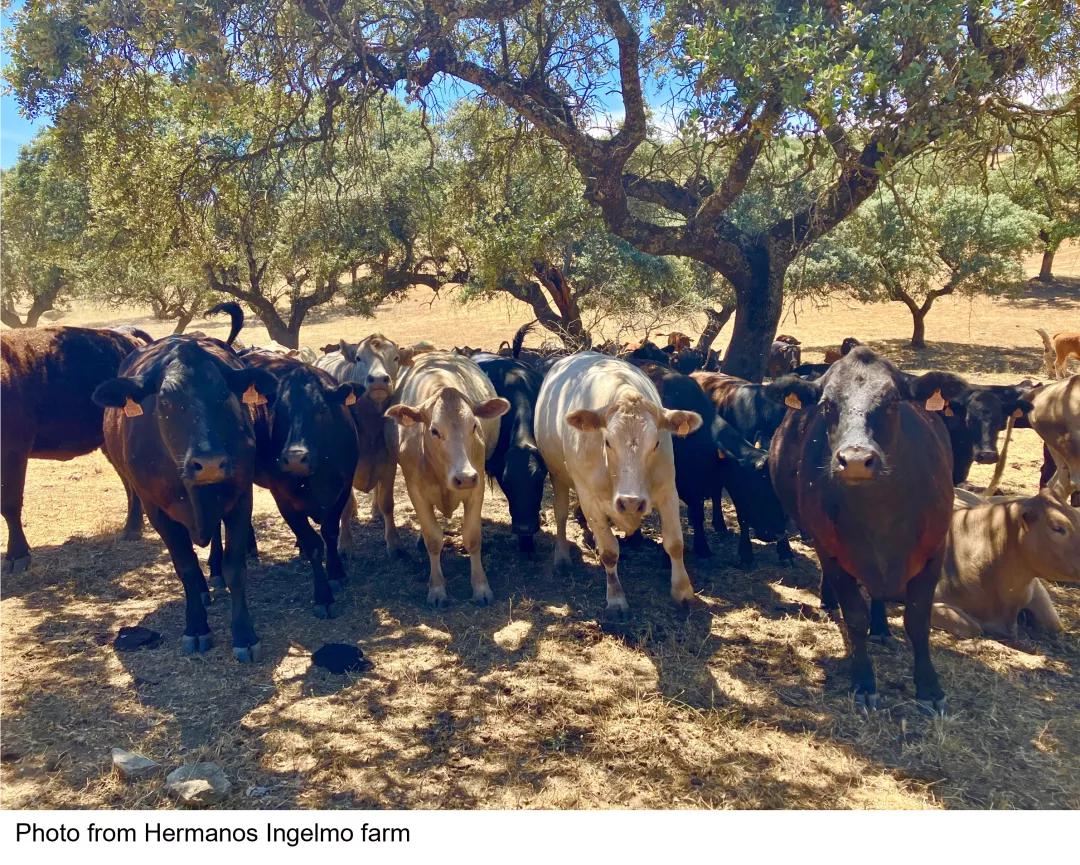Summary
The family farm of Agustín Ingelmo and his brother is located in the north of Extremadura, Spain. The two brothers practice livestock farming in a ‘dehesa’ - an agroforestry system characterised by holm oaks and cork oaks - with a lower layer of grassland and scrub, which is typical of the western part of the Iberian Peninsula. The area is facing significant problems of depopulation and generational renewal. Financial support from the first pilar of the CAP allows the farmers to continue managing their agrosilvopastoral farm based on competitive and profitable livestock management. This also enables them to continue to work and live in a rural area, while contributing to its environmental protection.
Results
- CAP funds allow the two brothers to increase the competitiveness of their livestock farm and therefore to continue to live in a rural area.
- The support received has contributed to sustaining two full time jobs.
- Agrosilvopastoral systems have made a substantial contribution to the sustainable management of the ‘dehesa’.
Ressourcen
Documents
Context
Agustín Ingelmo decided to dedicate himself to livestock farming after the company he was working for in the metal-mechanical industry closed down. Agustín and his brother practise livestock farming in a ‘dehesa’, which is an agroforestry system characterised by holm oaks and cork oaks, with a lower layer of grassland and scrub. The ‘dehesa’ that they manage is typical of agroforestry systems in the western part of the Iberian Peninsula and is located in the municipalities of Plasencia and Malpartida de Plasencia, in the Extremadura region.
Agustín believes that cooperation is an essential part of being competitive and of ensuring that their products sell for a fair price. The two brothers are members of the COBADU livestock cooperative, which provides them with supplies for livestock production (mainly feed for cattle). The cooperative also organises the sale of veal when meat prices are high. The farm has Protected Geographical Identification certification: PGI Ternera de Extremadura (Beef from Extremadura).
The two brothers innovated by introducing the Aberdeen Angus breed to the area. The fact that the breed is so docile makes it easier to handle, which reduces labour costs and increases animal welfare, while the excellent quality of the meat fetches higher prices at the marketplace.
Environmental respect is inextricably linked to the farm’s day-to-day work and life. The agroforestry system of the pasture has certain limitations which are respected by the farm, such as not building ponds to retain rainwater and not using feedlots.
The farm also has a forest management plan, which is a regional requirement for farms with a surface area of more than 500 ha. The plan is renewed every four years.
Objectives
The direct payments received by Agustín and his brother support the farmers and allow them to continue managing their agrosilvopastoral farm in a way that is conducive to competitive and profitable livestock production. This allows them to sustain the rural life and work that is important to them, while contributing to environmental protection.
Activities
The family farm receives CAP support to maintain their livestock activity.
The farm is working on adopting the digital Farm Notebook for their livestock activity, which will come into force in 2024.
Management and maintenance of the agroforestry system ‘dehesa’.
Main results
-
CAP funds allow the two brothers to increase the competitiveness of their livestock farm and therefore to sustain their jobs in a rural area. In Agustín’s opinion, if they did not receive funds from the CAP, their farm business would not be viable.
-
Belonging to the livestock cooperative has allowed the two brothers to improve their position in the food supply value chain. The cooperative negotiates input prices (mainly animal feed and straw) and organises the sale of produce; sharing management costs with the other members of the cooperative.
-
Agrosilvopastoral systems have made a substantial contribution to the sustainable management of the ‘dehesa’.
Key lessons and recommendations
The factors to be taken into account when transferring this example are as follows:
-
Cooperation in the agrarian sector, as part of the food value chain, is an essential part of competitive agriculture and livestock farming and for increasing the capacity for commercial negotiation and shared input costs as well as access to technical advice.
-
Support actions such as direct payments from the CAP help to prevent outmigration in rural areas.
-
Income diversification for livestock farms that operate in an agrosilvopastoral system is an important factor for competitiveness. This includes cattle breeding, selling firewood and managing the ecosystem of the ‘dehesa’.
